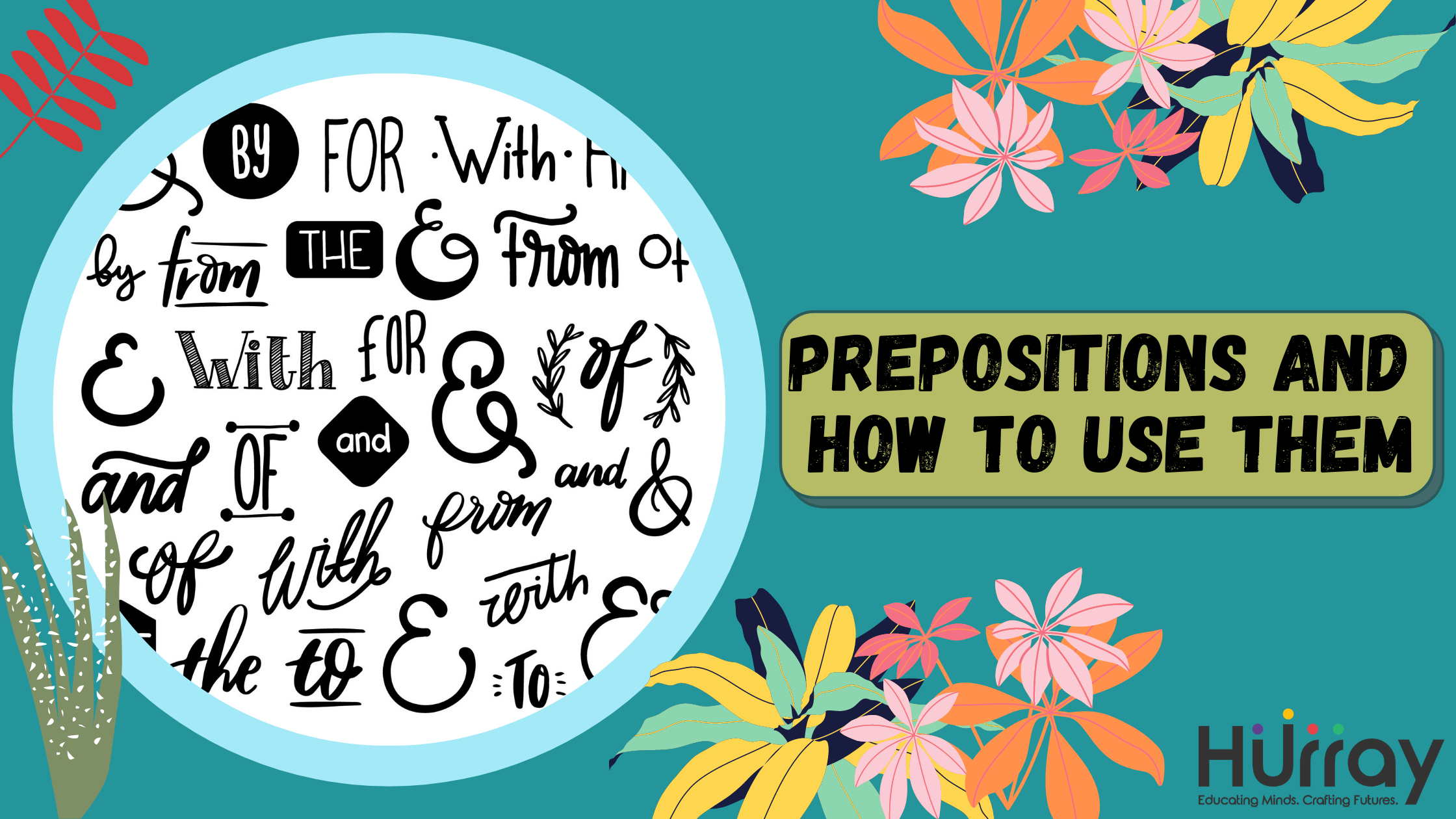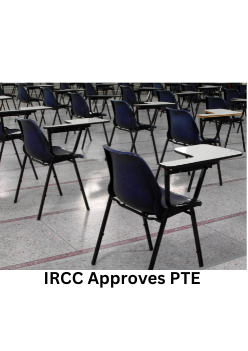Building Blocks of English: Prepositions
Looking for how-to’s, tips and techniques for English language skill-development? Well, you have come to the right place!
Whether you wish to ace an international test like IELTS or PTE, or just to prep yourself for study or work abroad, we at Hurray are here to help you. You can now take up English online training to strengthen your communicative skills. In addition to that, if you are planning to study abroad or work, immediately, then you can opt for IELTS online training, PTE online training or OET online training depending on your requirements.
We’ve launched a series of blog posts, wherein we take up one component of language at a time, and unveil its various nitty-gritties – this time, prepositions! Read on to learn more.
P.S. don’t forget to update yourself with what we’ve already covered! You can check out blog posts on Adjectives (link here) and Articles (link here)!
Prepositions: what are they and how do you use them?
Prepositions are of various types playing various functions – all of them however are related to one major, primary function:
|
Prepositions denote relationships between words in a sentence. |
The most common prepositions are the following:
|
in |
at |
of |
to |
From |
on |
|
The dog is in the kennel.
I will be there in two minutes.
|
Come here at once.
He is at the market. |
I have a sack of potatoes.
I have plenty of time.
|
We need air to breathe.
He spoke to her sweetly.
|
I took the book from him.
From what time will he be free? |
On what condition will he come?
Drop the basket on the floor. |
Each of these prepositions plays multiple functions in different sentences. In addition, there are several prepositions that play only one or two of these functions.
We will sum up each of these preposition-functions as follows, along with plenty of examples:
1. Direction
Prepositions are used to denote the direction of a verb showing movement, as it links or relates one noun and another.
|
Example |
Explanation |
|
They dumped the garbage opposite the beach. |
‘Opposite’ is the preposition denoting the direction of the action of dumping, in relation to the beach. |
|
“Walk towards the main entrance.” |
‘Towards’ is the preposition helping to tell the listener the direction he should walk, in relation to the main entrance. |
|
The dog jumps onto the ledge. |
‘Onto’ is the preposition denoting the direction of the dog jumping in relation to the ledge. |
Other examples of prepositions for direction include: across, around, through, under etc.
2. Position
Prepositions are used to denote the position of a noun in relation to another noun. The noun here is at rest (i.e. there is no movement).
|
Example |
Explanation |
|
I saw Rahul in front of the bank. |
‘In front of’ is the preposition telling us the location of Rahul in relation to the bank. |
|
The book is near the laptop. |
‘Near’ is the preposition telling us the location of the book in relation to the laptop. |
|
That dress looks great on Emily. |
‘On’ is the preposition telling us the position of the dress in relation to Emily. |
|
I will keep the toys with me. |
‘With’ is the preposition telling us the position of toys in relation to the speaker. |
3. Place/Location
Prepositions are used to denote a verb/action as being located in a place. Here again, there is no movement – the action is happening in one place.
|
Example |
Explanation |
|
We saw a movie at the theatre. |
‘At’ is the preposition denoting the location of the action of ‘seeing a movie’. |
|
Sheila stayed in the Hilton hotel. |
‘In’ is the preposition denoting the location of ‘staying’. |
|
They camped on a mountain. |
‘On’ is the preposition denoting the location of ‘camping’. |
Other examples of prepositions for position/location include: beside, by, above, under, over etc.
4. Time
Prepositions are used to denote different aspects of time in relation to events – including starting/ending times, duration, passage of time etc.
|
Example |
Explanation |
|
It has been several hours since anyone has seen John. |
‘Since’ is the preposition denoting how much time has passed in relation to a particular event i.e. ‘seeing John’ |
|
“Why did you leave before everyone else did?” |
‘Before’ is the preposition denoting when an event took place i.e. the speaker leaving, in relation to the second event i.e. everyone else leaving. |
|
The movie will be from 9.30 to 11.30 am. |
‘From’ is the preposition denoting the starting point and duration of an event. |
Other examples of prepositions for time include: until, after, during, prior etc.
5.Other uses of prepositions
The above prepositions denoting space (direction, position, location) and time, are the most basic.
Besides these, there are prepositions that perform a variety of other functions.
a. Purpose/Cause – prepositions are used to tell us the purpose or cause of a particular action.
Examples:
|
Example |
Explanation |
|
I bought a bag of nuts. |
Each of the prepositions i.e. ‘of’, ‘for’, ‘to’ and ‘because’ are denoting the purpose or cause of particular actions.
As you can see in the last example, the causing-action i.e. “working hard” may come before or after the preposition. |
|
I baked a cake for my best friend’s birthday. |
|
|
Naithik requires my notes to study. |
|
|
She won the award because she worked hard. |
b. Contrast – prepositions are used to establish a relationship between one action i.e. the main action, and a second oppositional action.
Here, the main action stands alone, with the oppositional action combined with the preposition.
Examples:
|
Example |
Explanation |
|
I do like that shirt, however I do not think it will fit me. |
‘However’, ‘in spite of’ and ‘although’ are the prepositions in these sentences.
As you can see in the last example, the preposition + oppositional action i.e. ‘although’ + ‘working hard’, may come at the beginning or at the send of the sentence. |
|
Diya was always happy, in spite of having to face many obstacles. |
|
|
Although she worked hard, she did not win the award. |
Other examples of prepositions for contrast include: though, in spite of*, albeit, nevertheless etc.
*Avoid this common mistake! While despite and in spite can be used interchangeably, there are rules for the use of each one:
|
Incorrect |
Correct |
|
Despite of her troubles, she persisted. |
Despite her troubles, she persisted. |
|
In spite her troubles, she persisted. |
In spite of her troubles, she persisted. |
The difference is simple – it is always ‘despite’ or ‘in spite of’!
Rules for preposition use
1.Sentence structure
The most important rule to be remembered is that regarding preposition placement in a sentence.
For the sake of explanation, we will divide the sentence into 2 parts – the phrase containing the verb and at least one noun, in most cases; and the prepositional phrase which consists of one preposition and one noun.
Examples:
|
Phrase containing the verb |
Prepositional phrase: preposition + noun/pronoun |
|
|
The dog jumps |
over |
the fence. |
|
Give that book |
to |
me. |
|
I will be gone |
until |
midnight. |
|
Will you stay |
with |
me? |
Based on this, you may identify the following principles:
- The verb will never come after the preposition.
- The preposition is always used along with a noun
P.S. in certain cases, a preposition may be used to join two separate phrases, both of which contain verbs – this is usually the case with prepositions used to denote ‘contrast’ as you saw above.
2. Alternative preposition placement
- In certain cases, the preposition may be placed at the end of the sentence. Some examples include:
There is nobody to hind behind.
Where did you come from?
- In certain cases, usually in questions, the preposition may be placed at the beginning of the sentence. Some examples include:
With whom are you staying?
From where did you come?
3.Do not use unnecessary prepositions
- In some cases, the preposition may be dropped completely. For instance,
Incorrect: She entered into the room Correct: She entered the room
Incorrect: We discussed about the business plan Correct: We discussed the business plan
- Take care that you do not repeat prepositions in a sentence:
Incorrect: From where did he come from?
Correct: From where did he come? OR Where did he come from?
Tips to Improve
The peculiar thing about prepositions is that, as you have seen, there are no hard and fast rules regarding where they may be used and for what function.
How then do you keep track?
The answer is simple: practice and familiarity!
Expose yourself to English in use, through reading and listening to good material. The more you see the various prepositions being used, the quicker it becomes second nature!
What next?
Any expert would tell you that the best way to improve your language skills, is with a knowledgeable and experienced trainer – someone with deep understanding of the nitty-gritties of language. Hurray, is also one of the few centers in offering major english profieciency test training such as IELTS online training, PTE Online Training and OET online training in addition to English Online training. We can provide you with assistance, helping you to learn the rules, put them into practice, and improve your overall language skills.
You can reach out to us at info@hurrayedutech.com or call us on 8971357938, to learn more.
* Production of this material without written permission from the company will result in legal and criminal action against all perpetrators.











Post Comments